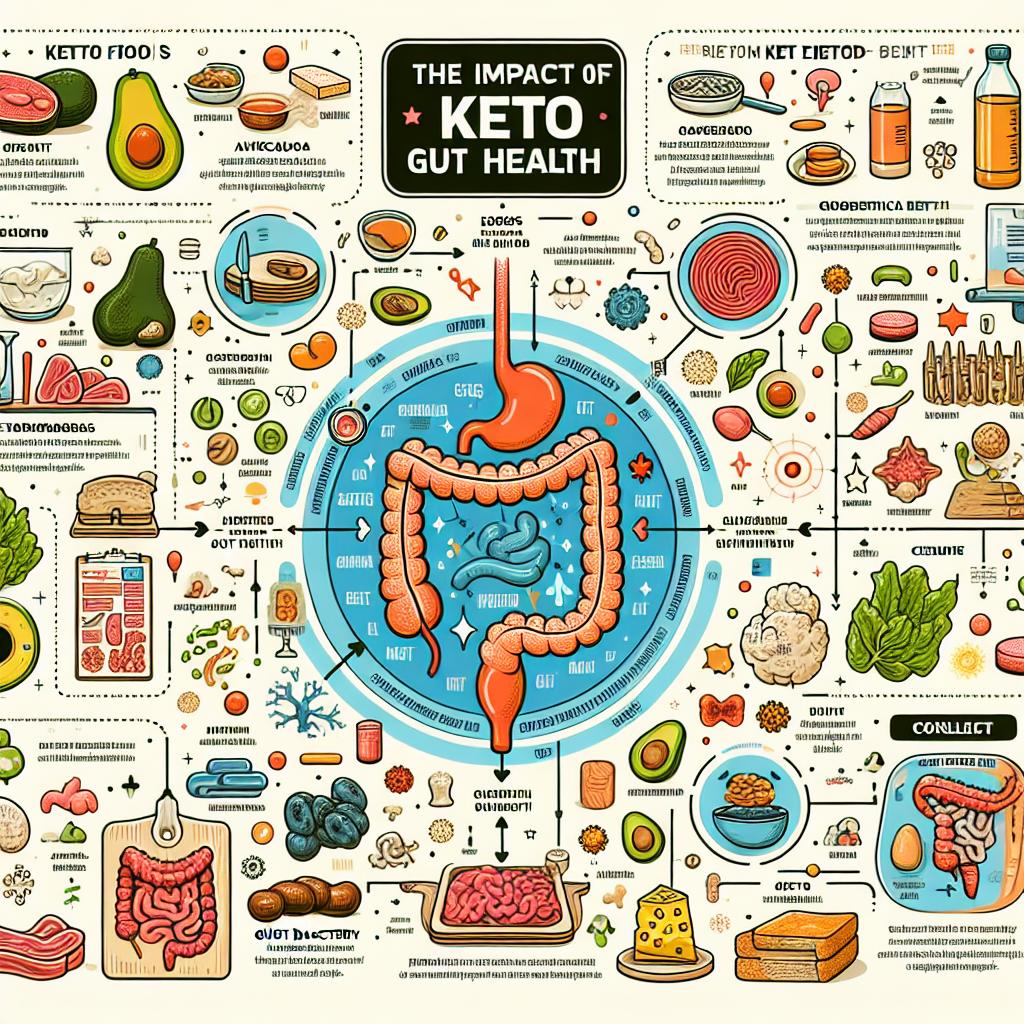This post may contain affiliate links which means I may receive a commission for purchases made through links. Learn more on my Private Policy page.
The Hidden Realm: Unraveling the Impact of Keto on Gut Health
Welcome to the fascinating, often misunderstood universe of gut health—a world bustling with trillions of microorganisms, where balance is key and harmony reigns supreme! As we dive into the popular ketogenic diet, it’s impossible to overlook the ripple effects it can have on our gut flora. With its low-carb, high-fat approach, the keto lifestyle has gained fervent followers who tout its impressive weight-loss benefits and energy boosts. But as we embrace this high-fat journey, it’s crucial to take a moment to explore how our bodies’ inner ecosystem responds to such a seismic shift. Does keto nurture the beneficial bacteria we rely on, or does it throw our gut’s natural balance off-kilter? Join us as we embark on this enlightening expedition to discover the profound connection between the keto diet and gut health, and uncover ways to keep those tiny warriors in our intestines happy and thriving!
Exploring the Connection Between Keto and Your Gut Microbiome
The ketogenic diet, characterized by its low carbohydrate and high-fat intake, not only transforms body metabolism but also creates a unique environment for our gut microbiome. A shift to this eating style may encourage the proliferation of certain beneficial bacteria, contributing to a more balanced gut ecosystem. Some of the remarkable changes in gut flora observed with keto include:
- Increased Diversity: Keto may promote a wider variety of gut bacteria.
- Enhanced Bacterial Growth: Certain beneficial strains thrive on the ketone bodies produced during fat metabolism.
- Decrease in Pathogenic Bacteria: A reduction in sugar intake can inhibit harmful bacteria that thrive on sugars.
Interestingly, the impact of dietary fats from healthy sources has shown potential to beneficially modify the gut microbiome composition. For instance, omega-3 fatty acids found in fatty fish and flaxseeds can support the growth of beneficial bacteria while providing anti-inflammatory effects. It raises the question—what specific types of fats and their sources are most impactful for gut health on a keto diet?
| Type of Fat | Gut Health Benefits |
|---|---|
| Omega-3 | Reduces inflammation and supports diverse microbiota. |
| Medium-Chain Triglycerides (MCTs) | May enhance fat-burning and beneficial microbial growth. |
| Monounsaturated Fats | Improves overall gut health and supports good bacteria. |

The Good, The Bad, and The Fermented: Navigating Keto Foods for Optimal Digestive Health
Embarking on a keto diet can feel like a culinary rollercoaster ride, especially when you’re keen on maintaining your digestive health. On one hand, the good aspects of keto, rich in healthy fats and proteins, can help reduce inflammation and encourage a more stable blood sugar level. This dietary shift can promote beneficial gut bacteria, contributing to a more balanced microbiome. However, navigating through the myriad of keto-friendly foods can also lead to digestive dilemmas. Often, the absence of fiber-rich foods like fruits and whole grains may create a landscape less friendly for your gut. It’s essential to incorporate low-carb, high-fiber vegetables to maintain that flourishing gut garden.
Moreover, we can’t overlook the bad side of the keto trend, particularly when it comes to processed foods masquerading as “keto-friendly.” These often contain artificial additives that may disrupt gut health, leading to discomfort or irregularities. To foster a beneficial digestive environment, include fermented foods in your meals. Incorporating items such as kimchi, sauerkraut, and Greek yogurt can enrich your gut flora with probiotics, which help to balance out the adverse effects of a high-fat diet. Here’s a quick comparison:
| Food Type | Effects on Gut Health |
|---|---|
| Fermented Foods | Boost probiotic levels, improve digestion |
| Processed Keto Snacks | May disrupt gut flora, cause bloating |
| Low-Carb Vegetables | High in fiber, promote gut regularity |
Boosting Your Gut Health on a Keto Diet: Tips for Incorporating Fiber
To thrive on a keto diet while supporting your gut health, it’s essential to prioritize your fiber intake. Fiber plays a crucial role in maintaining a healthy gut microbiome, promoting regular digestion, and preventing constipation often associated with low-carb diets. Incorporating low-carb, high-fiber foods can enhance your overall health and well-being. Here are some fiber-rich options that align perfectly with your keto lifestyle:
- Avocados: Packed with both healthy fats and fiber, these green gems can easily be incorporated into salads, smoothies, or eaten on their own.
- Chia Seeds: A powerhouse of omega-3 fatty acids and fiber; they can be added to puddings or sprinkled over dishes for an extra crunch.
- Flaxseeds: These tiny seeds are excellent for improving digestion and can be ground and added to keto-friendly baked goods.
- Leafy Greens: Spinach, kale, and Swiss chard are all low in carbs and high in fiber, making them ideal for salads and side dishes.
Additionally, fermented foods can significantly aid in gut health due to their probiotic content. Integrating options such as sauerkraut, kimchi, and unsweetened yogurt can foster a healthy gut microbiome. Below is a simple comparison of fiber content in popular low-carb vegetables to help you choose wisely:
| Vegetable | Net Carbs per 100g | Fiber Content (g) |
|---|---|---|
| Spinach | 1.4g | 2.2g |
| Broccoli | 4.0g | 2.6g |
| Zucchini | 2.1g | 1.0g |
| Kale | 3.6g | 4.1g |

Listening to Your Body: Recognizing Signs of Gut Health Changes on Keto
When transitioning to a ketogenic diet, it’s essential to stay attuned to how your body responds—particularly regarding gut health. The initial shift to a low-carb, high-fat lifestyle can cause a variety of digestive changes. Here are some signs that your gut health may be adjusting:
- Changes in Bowel Movements: You might experience constipation or diarrhea as your body adapts to a new source of energy.
- Increased Gas and Bloating: Some individuals report heightened gas production or bloating as they introduce more fats into their diet.
- Food Cravings: If you find yourself craving non-keto foods, it may indicate that your gut microbiome is in flux.
Keeping an eye on these symptoms can help you identify any possible issues early on. Incorporating gut-friendly foods can help mitigate some negative effects. Consider adding foods such as:
| Gut-Friendly Foods | Benefits |
|---|---|
| KFermented Vegetables | Boosts probiotics for better digestion. |
| Bone Broth | Helps heal the gut lining and soothes inflammation. |
| Low-Carb Fruits | Provides essential vitamins while being gentle on blood sugar. |
Q&A
Q&A: The Impact of Keto on Gut Health
Q1: What exactly is the keto diet, and how does it work?
A: The keto diet is a low-carbohydrate, high-fat eating plan that encourages your body to enter a state of ketosis, where it burns fat for fuel instead of carbs. By drastically reducing your carb intake and replacing it with fat, you’re basically flipping the fuel switch on your body. It’s like going from regular fuel to premium—it can be a game changer!
Q2: So, how does keto impact gut health?
A: Great question! The keto diet can have mixed effects on gut health. For some, it may help reduce inflammation and promote gut healing due to lower sugar intake. However, the reduced fiber from cutting out many fruits, whole grains, and legumes can leave some gut bacteria feeling a bit hungry and out of sorts. It’s all about balance here!
Q3: What are the potential benefits of keto for the gut?
A: One of the silver linings of the keto diet is its potential to reduce symptoms of certain gastrointestinal disorders, like irritable bowel syndrome (IBS). The lower sugar levels can lead to less bloating and discomfort. Plus, some people find improved digestion and regularity as they ditch the carbs and embrace healthy fats.
Q4: Are there any downsides to consider?
A: Absolutely! The keto diet can lead to constipation due to its low fiber content. Without enough fiber-rich foods, your gut motility can suffer, leaving you feeling, well, a bit stuck! Some people may also experience a temporary ‘keto flu’ as their bodies adjust, which can include digestive upset. Listen to your body and consider integrating keto-friendly, high-fiber veggies to keep things moving!
Q5: How can I promote good gut health while on keto?
A: Ah, the secret sauce! Focus on incorporating plenty of low-carb, fiber-rich foods like leafy greens, avocados, nuts, seeds, and non-starchy vegetables. Fermented foods such as sauerkraut, kimchi, and Greek yogurt (if dairy isn’t an issue) can also introduce those friendly gut bacteria. Think of it as giving your gut a delicious little party while you’re on keto!
Q6: Do I need to worry about long-term effects of keto on my gut health?
A: Keeping an eye on your gut health is always a smart move! For most, a well-formulated keto plan doesn’t lead to long-term gut issues, especially if it includes a variety of nutrient-dense foods. However, it might be wise to periodically reassess your diet and even cycle in some carbs if you find your gut is less than thrilled.
Q7: Is the keto diet suitable for everyone?
A: While many people thrive on the keto diet, it’s not a one-size-fits-all approach. It’s super important to check in with a healthcare provider or a nutritionist before diving in, especially if you have pre-existing gut health concerns or metabolic conditions. After all, your gut deserves the best care possible!
Q8: What’s the bottom line for keto and gut health?
A: The essential takeaway is that the keto diet can be a double-edged sword for gut health. It can bring benefits or contribute to challenges, depending on how you approach it. Like all good things, moderation and variety are key! Embrace the journey, listen to your body, and don’t be afraid to tweak your diet as needed. Your gut will thank you!
Insights and Conclusions
As we wrap up our exploration of the intricate dance between the ketogenic diet and gut health, it’s clear that this journey is as complex as our own digestive systems. Embracing keto can certainly bring about a suite of benefits, from weight management to heightened mental clarity. However, it’s essential to remember that our guts are uniquely ours—each with its own set of bacteria, preferences, and quirks.
As you navigate this dietary path, consider tuning into your body’s signals and perhaps prioritizing a variety of nutrient-dense, gut-friendly foods. Incorporating fiber-rich vegetables, fermented delights, and plenty of hydration can create a harmonious balance that supports both your keto ambitions and your gut ecosystem.
Ultimately, the impact of keto on gut health is an evolving narrative—one filled with possibilities, discoveries, and a bit of trial and error. So, embrace the adventure, listen to your body’s needs, and keep your gut happy! Here’s to health, happiness, and the positive transformation that awaits on your keto journey. Happy eating!

